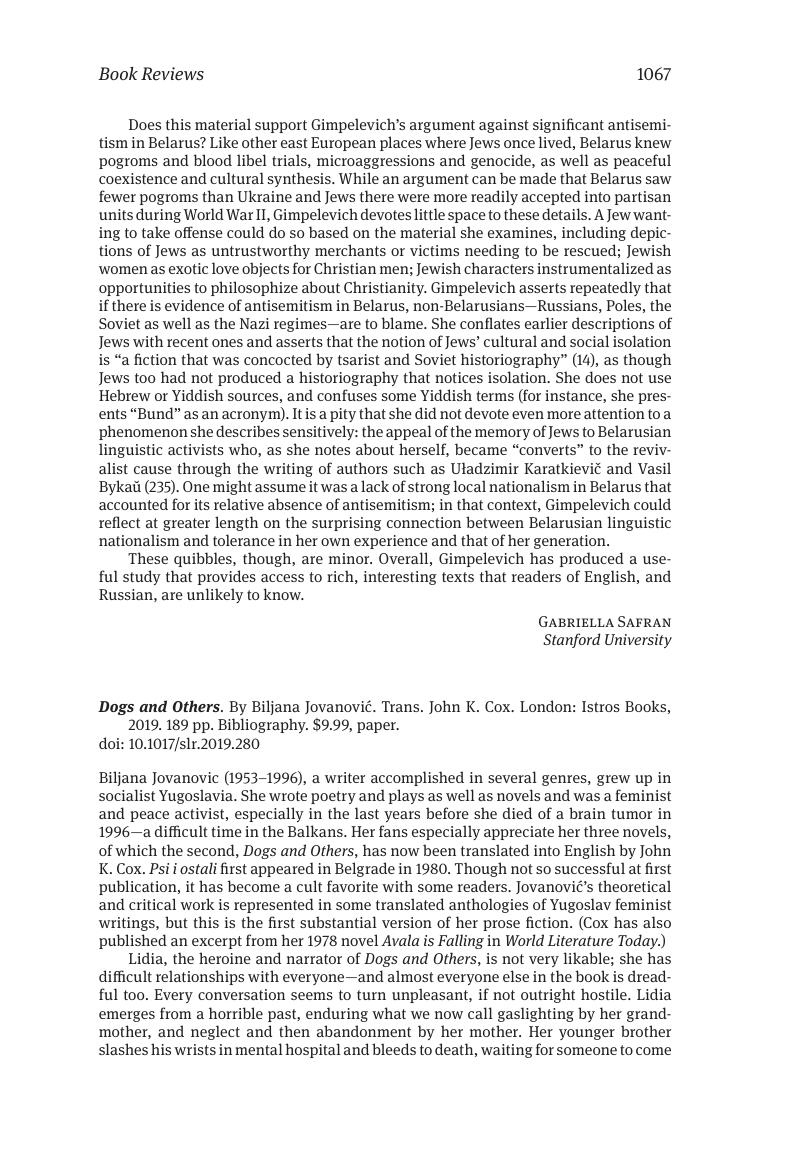Biljana Jovanovic (1953–1996), a writer accomplished in several genres, grew up in socialist Yugoslavia. She wrote poetry and plays as well as novels and was a feminist and peace activist, especially in the last years before she died of a brain tumor in 1996—a difficult time in the Balkans. Her fans especially appreciate her three novels, of which the second, Dogs and Others, has now been translated into English by John K. Cox. Psi i ostali first appeared in Belgrade in 1980. Though not so successful at first publication, it has become a cult favorite with some readers. Jovanović’s theoretical and critical work is represented in some translated anthologies of Yugoslav feminist writings, but this is the first substantial version of her prose fiction. (Cox has also published an excerpt from her 1978 novel Avala is Falling in World Literature Today.)
Lidia, the heroine and narrator of Dogs and Others, is not very likable; she has difficult relationships with everyone—and almost everyone else in the book is dreadful too. Every conversation seems to turn unpleasant, if not outright hostile. Lidia emerges from a horrible past, enduring what we now call gaslighting by her grandmother, and neglect and then abandonment by her mother. Her younger brother slashes his wrists in mental hospital and bleeds to death, waiting for someone to come rescue him. Interspersed letters from an anonymous neighbor, whom Lidia decides to call Vespasian, add a different note. He describes himself as older and confined to a wheelchair; his final letter is misogynist and unpleasant. The narrator says little about these elements, but they definitely suggest thoughts about the place of entitled patriarchy in 1970s Yugoslavia, a kind of reverse image of the author's feminism. Chains of sexual abuse recur in the novel, where a character who has been raped or assaulted then abuses another character. All and all Dogs and Others offers a deep but never didactic depiction of the consequences of earlier neglect and mistreatment.
Russian poet Marina Tsvetaeva shows up twice in the narration—once à propos of her suicide by hanging, and once regarding her shaved head at a moment in her adolescence, a detail so specific that Jovanović must have been reading Tsvetaeva's memoir of Maks Voloshin, or a biography citing it. Perhaps Tsvetaeva is chosen as a female author who had sexual adventures with men and women; the novel's queer content is important and quite unusual for its time. Sexual encounters, often violent and undesired but sometimes tender, are described matter-of-factly, and the sex involves lots of bodily secretions, especially snot, spit, and semen. Snot and spit appear frequently throughout the book, keeping the many tears of its characters during unpleasant interactions from becoming sentimental.
This novel challenges its translator to preserve its great stylistic variety, as colloquial language mixes with sophisticated vocabulary. The latter can result in moments of genuine poetry, such as (briefly) “. . .for they are hymenopterous, timeless beings” (29). The (anti-)heroine and narrator, though not much like Jovanović herself, works in a library and is comfortable with elegant words or references to high culture. The translation's style overall can be a bit more formal than it needs to be, as if following the Serbian precisely rather than using contractions as in colloquial English. Cox, who translates from Albanian and Hungarian as well as Serbian, maintains the many comma splices and run-on sentences with sharply swerving topics. He successfully conveys the unusual quality of the original style; for this reviewer the style lingered for a while agreeably in her own thinking after every reading session.
Cox provides a short informal “In Place of an Introduction,” with a helpful list of the characters whose names begin with the letter M: almost everyone else important enough to have a name, besides the main character, her brother Danilo and her grandmother Jaglika. This (non-)introduction would not put off a non-academic reader, though I wonder how many non-academic readers might care to read such a book, which rewards wider knowledge of literature and feminist scholarship. A more academic afterword and a bibliography of Jovanović’s substantial publications—most still untranslated—follow the text of the novel itself.
Dogs and Others will interest anyone interested in LGBTQ literature and history, women's writing, Serbian or Yugoslav literature, and literature in general, though best for readers who can perceive the complexity of its intentions.



